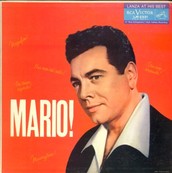recording of The Student Prince), religious songs ("The Lord’s Prayer," "Guardian Angels"), the one-of-a-kind "Song of India," Edwardian-era ballads (the MGM "Because"), Neapolitan, Spanish and Italian songs (“Granada,” the 1955 “Torna a Surriento,” the 1949 "Mamma Mia, Che Vo' Sape?"), and, of course, opera.
While Lanza never actually recorded a complete work, despite singing two roles on the operatic stage (and learning an additional five), his legacy of arias and duets abounds with some astonishing renditions: the 1949 "Che Gelida Manina," "M'appari'," several splendid versions of "Vesti la Giubba”, the Monologue from Otello, and many many more.
Voce 'e Notte
But for me, one song in particular stands out as the most soul-baring piece of singing he ever delivered: "Voce 'e Notte." This is Lanza’s vocal cri de coeur. The song expresses the anguish of a lovesick man, alone in the night, looking up at the bedroom window where his beloved now lies in the arms of her husband. If this voice that is crying into the night awakens your man, he sings, don't be afraid, for there are no names in my serenade… If ever a person wanted proof of Lanza’s complete identification with his material, then this recording is surely it. While in Rome I once reduced a family of Neapolitans to tears with this rendition. "For God’s sake, put something happy on --- quick!" urged my New Zealand travelling companion, alarmed by the family’s reaction. But he needn’t have worried. That family’s spontaneous display of emotion said it all, and no artist could have asked for a greater compliment. Mario Lanza: I salute you.
| |

